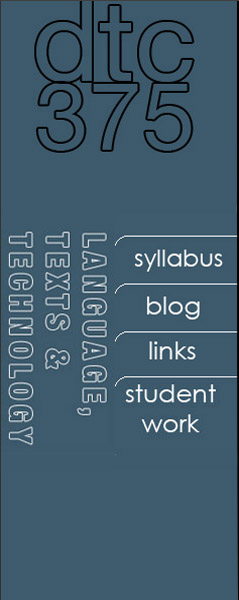
- Marshall McLuhan, "Understanding Media"
- “Immediacy, Hypermediacy, and Remediation” by Jay David Bolter and Richard Grusin from Remediation
- “Images as the Text: Pictographs and Pictographic Logic” by Johanna Drucker and Jerome McGann
- A is for Ox by Barry Sanders
- “The Gutenberg Galaxy” in Essential McLuhan (pg. 112-148)
- “Maps, Knowledge, and Power” by J. B. Hartley
- “Mapping the Digital Empire” by Jason Farman
- Hamlet on the Holodeck by Janet Murray, Ch. 3
- “A Rape in Cyberspace” by Julian Dibbell
- “Naked in the Nonopticon” from The Chronicle Review
- “With Friends Like These…” from The Guardian
- “How Twitter Creates a Social Sixth Sense” from Wired
- “How YouTube Changes the Way We Think” from Wired
- “The Secret World of Lonelygirl” from Wired
- Works of Electronic Literature, March 26:
- Ian Hatcher, “Signal to Noise”: http://clearblock.net/stn/
- Young-Hae Chang Heavy Industries, “Bust Down the Doors!”:
http://www.yhchang.com/BUST_DOWN_THE_DOORS!.html - Young-Hae Chang Heavy Industries. “Traveling to Utopia: A Brief History of Technology”:
http://www.yhchang.com/TRAVELING_TO_UTOPIA.html - J.R. Carpenter, “Entre Ville”:http://luckysoap.com/entreville/index.html
- Ingrid Ankerson and Megan Sapnar, “Crusing”:
http://collection.eliterature.org/1/works/ankerson_sapnar__cruising.html - Jay Bushman, “The Good Captain” (read just the beginning):
http://www.loose-fish.com/waifpole/the-good-captain/ - David Theo Goldberg & Stefka Hristova (design by Eric Loyer), “Blue Velvet: Re-Dressing New Orleans in Katrina’s Wake”:
http://vectors.usc.edu/issues/5/bluevelvet/
- “Can there be a Form Between a Game and a Story?” by Ken
Perlin in First Person (pg. 12-18)
- “A Preliminary Poetics for Interactive Drama and Games” by Michael Mateas in First Person (pg. 19-33)
- "Ludology" and “Towards Computer Game Studies” by Markku Eskelinen in First Person (pg. 35-44)
- “Genre Trouble: Narrativism and the Art of Simulation” by Espen Aarseth in First Person (pg. 45-55)
- “Representation, Enaction, and the Ethics of Simulation” by
Simon Penny in First Person (pg. 73-84)
- “Videogames of the Oppressed: Critical Thinking, Education, Tolerance, and Other Trivial Issues” by Gonzalo Frasca in First Person (pg. 85-94)